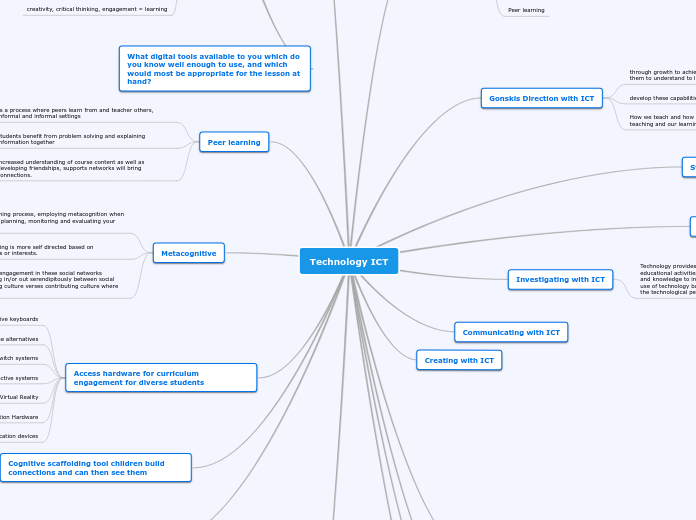Technology for Inclusive Environment
Examples of technology to support inclusive learning
Digital manipulatives
OS Support
Speech input: ipad Dictation tool
What does curriculum require?
Recognise
Critically evaluate
Understand
Write
Plan
Explain
Clarify
Curriculum intent
we can make appropriate adjustments in assessment tasks to allow the student to respond.
Responding to the curriculum is often less restrictive than what is though or what is being provided.
Understand the meaning of the descriptors difference between writing and handwriting.
Understanding what the curriculum is wanting the students to know and do
Access Hardware for Curriculum engagement
Subtopic
communication devices
transformation hardware
virtual reality
interactive systems
switch systems
mouse alternatives
4 General Areas of Assistive technology
Framework: applications to cater to learning needs
Curriculum: applications to enhance learning in a specific curriculum focus
Supportive: technologies to improve efficiency within learning episodes
Access: technologies to enable students to engage with the curriculum.
Technological knowledge
What digital tools available to you which do you know well enough to use, and which would most be appropriate for the lesson at hand?
Pedagogical knowledge
Processes, practices and methods management theories and students
How do students learn best and what instructional strategies do you need to meet their needs and the requirements of the lesson
Content Knowledge
What are the we teaching and what is your own knowledge of the content?
Subject knowledge
Technology ICT
Technology for inclusive education
Framework- applications to cater learning needs
Curriculum- applications to enhance learning in a specific curriculum focus
Supportive- technologies to improve efficeincy within learning episodes
Access - Technologies to enable students to engage with the curriculum
Australian Curriculum and ICT = General capability
PCK Pedagogical content knowledge
Pedagogy matters
Enhance learning
Learning with ICT
Cognitive scaffolding tool children build connections and can then see them
Access hardware for curriculum engagement for diverse students
Communication devices
Transformation Hardware
Virtual Reality
Interactive systems
Switch systems
Mouse alternatives
Alternative keyboards
Metacognitive
How do teachers engagement in these social networks situations? Moving in/or out serendipitously between social media. Consuming culture verses contributing culture where teacher prefer.
Professional learning is more self directed based on professional needs or interests.
Thinking and learning process, employing metacognition when studying includes planning, monitoring and evaluating your efforts
increased understanding of course content as well as developing friendships, supports networks will bring connections.
students benefit from problem solving and explaining information together
Is a process where peers learn from and teacher others, informal and informal settings
Learning theories TPACK
creativity, critical thinking, engagement = learning
Behaviourist - Cognitivist
Pedagogy: Direct Instruction
Software: Tutorial programs
Knowledge exist external to the child and transmitted and received.
TPACK is the basis of effective teaching with with technology requiring an understanding of:
Knowledge of how technologies can be used to build on existing knowledge to develop new epistemologies or strengthen old ones
Knowledge of students prior knowledge and theories of epistemology
Knowledge of what makes concepts difficult or easy to learn and how technology can help redress some of the problems that students face
Pedagogical techniques that use technologies in constructive ways to teach content
The representation of concepts using technologies
Constructivist - Constructionist
Pedagogy: Project based learning
Software that mediates learning
Children construct reality from their perceptions construct their own knowledge.
Pedagogy Strategies/ methods
Technology tools/ Platforms/ software
Content: concept/ skills
Epistemic Beliefs
Relativism: That knowledge is uncertain and based on the weight of accumulated evidence (Transform, student centred and conjectural).
Relativist: Most knowledge as tentative and contextual and generated by the self. (transform, students centred, conjectural).
Multiplistic: Multiple views but still believe that most knowledge is certain. (mixed balanced, student centred).
Dualistic: right or wrong knowledge handed down by authority (instructional Teacher centred).
Instructional
Enables students to manipulate ideas and hypothesis to develop knowledge.
Revelatory
Activities knowledge in order for students to discover the concept.
Conjectural
Divides the learning activities into smaller units with use of positive negative feedback for corrections
Creating with ICT
Communicating with ICT
Investigating with ICT
Technology provides new methods and approaches for educational activities. Teachers should improve their ability and knowledge to integrate technology into instruction. The use of technology based learning is effectively used to improve the technological pedagogical content knowledge of teachers.
Teacher centred Approach
Teachers are designed to give task to students and students must complete follow rules, regulations and procedures.
Teachers are the active voice in the classroom, teachers are front of stage instructing students work
Student centred Approach
Teachers are guiding students students work and participation in the lesson.
Students are the active voice and students are interested in their learning and are motivated with the topic
Gonskis Direction with ICT
How we teach and how we use technology to help enhance our teaching and our learning our pedagogy
develop these capabilities, knowledge have changed
through growth to achievement, we need to help students for them to understand to learn.
Self regulation
Peer learning
Critical thinking what is this information to critical think
Metacognition knowing how students learn
Effort regulation
Skills required to operate various technologies
time management:

